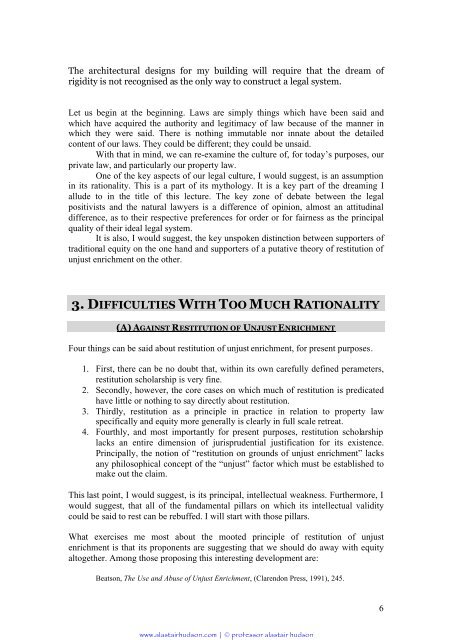England's dreaming equity, trust and conscience - alastairhudson.com
England's dreaming equity, trust and conscience - alastairhudson.com
England's dreaming equity, trust and conscience - alastairhudson.com
Create successful ePaper yourself
Turn your PDF publications into a flip-book with our unique Google optimized e-Paper software.
The architectural designs for my building will require that the dream ofrigidity is not recognised as the only way to construct a legal system.Let us begin at the beginning. Laws are simply things which have been said <strong>and</strong>which have acquired the authority <strong>and</strong> legitimacy of law because of the manner inwhich they were said. There is nothing immutable nor innate about the detailedcontent of our laws. They could be different; they could be unsaid.With that in mind, we can re-examine the culture of, for today’s purposes, ourprivate law, <strong>and</strong> particularly our property law.One of the key aspects of our legal culture, I would suggest, is an assumptionin its rationality. This is a part of its mythology. It is a key part of the <strong>dreaming</strong> Iallude to in the title of this lecture. The key zone of debate between the legalpositivists <strong>and</strong> the natural lawyers is a difference of opinion, almost an attitudinaldifference, as to their respective preferences for order or for fairness as the principalquality of their ideal legal system.It is also, I would suggest, the key unspoken distinction between supporters oftraditional <strong>equity</strong> on the one h<strong>and</strong> <strong>and</strong> supporters of a putative theory of restitution ofunjust enrichment on the other.3. DIFFICULTIES WITH TOO MUCH RATIONALITY(A) AGAINST RESTITUTION OF UNJUST ENRICHMENTFour things can be said about restitution of unjust enrichment, for present purposes.1. First, there can be no doubt that, within its own carefully defined perameters,restitution scholarship is very fine.2. Secondly, however, the core cases on which much of restitution is predicatedhave little or nothing to say directly about restitution.3. Thirdly, restitution as a principle in practice in relation to property lawspecifically <strong>and</strong> <strong>equity</strong> more generally is clearly in full scale retreat.4. Fourthly, <strong>and</strong> most importantly for present purposes, restitution scholarshiplacks an entire dimension of jurisprudential justification for its existence.Principally, the notion of “restitution on grounds of unjust enrichment” lacksany philosophical concept of the “unjust” factor which must be established tomake out the claim.This last point, I would suggest, is its principal, intellectual weakness. Furthermore, Iwould suggest, that all of the fundamental pillars on which its intellectual validitycould be said to rest can be rebuffed. I will start with those pillars.What exercises me most about the mooted principle of restitution of unjustenrichment is that its proponents are suggesting that we should do away with <strong>equity</strong>altogether. Among those proposing this interesting development are:Beatson, The Use <strong>and</strong> Abuse of Unjust Enrichment, (Clarendon Press, 1991), 245.6www.<strong>alastairhudson</strong>.<strong>com</strong> | © professor alastair hudson













